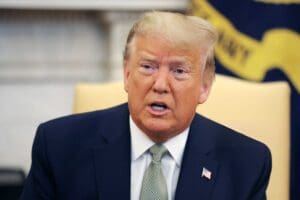
China has retaliated against President Donald Trump’s imposition of a 10 per cent tariff on its exports to the United States, announcing fresh duties on liquefied natural gas (LNG), coal and oil.
The rapid escalation between the world’s two largest economies has once again raised fears of a deeper trade war, sending shockwaves through global financial markets.
The pound declined 0.22 per cent against the dollar, trading at about $1.24 amid heightened uncertainty from the White House. Brent crude fell 1.3 per cent to slip below $75 a barrel, while the FTSE 100 dropped 0.5 per cent to 8540, hit notably by sell-offs in Diageo—reliant on North America for around a third of its annual $20 billion in sales—and other US-focused companies such as Rentokil and Reckitt Benckiser.
Investors also saw yields on UK government bonds inch upwards; the 10-year gilt rose 0.8 per cent to 4.52 per cent. Analysts warn that inflationary pressures could mount if tariffs lead to further supply chain disruptions.
The STOXX 600 pan-European index dipped 0.3 per cent, extending Monday’s steepest one-day drop in over a month. Oxford Economics, meanwhile, downgraded China’s economic growth outlook, citing a high likelihood of additional trade barriers taking hold.
Beyond the retaliatory tariffs on US imports of coal, LNG and crude oil, China’s commerce ministry and customs administration announced tighter controls on exports of tungsten, tellurium, ruthenium, molybdenum and ruthenium-related items. These rare minerals are crucial to the clean energy sector, and Beijing’s move has sparked concerns over potential supply shortages worldwide.
While Trump has shelved his threat of 25 per cent tariffs on both Mexico and Canada—granting them a 30-day grace period in exchange for pledges around border security—he has pushed ahead forcefully with measures targeting China. He has also demanded Beijing address the flow of the deadly opioid fentanyl into the US, threatening “substantially higher” tariffs if it does not.
China and the US have previously clashed in a major trade war, begun under Trump in 2018. That episode saw tit-for-tat duties on hundreds of billions of dollars’ worth of goods, disrupting global commerce for two years. A deal reached in 2020 to bolster China’s annual imports of US goods by $200 billion never met its targets, partly due to the pandemic. China’s trade deficit with the US stood at $361 billion last year.
As markets brace for more volatility, the risk of inflation in the UK and elsewhere looms large if the conflict continues to upend supply chains. Although British officials have drawn up contingency plans, they remain wary of enacting any retaliatory measures that might invite further reprisals from the White House.
Read more:
China strikes back with tariffs on US imports as global markets wobble




